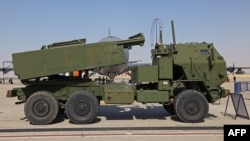U.S. President Joe Biden said Wednesday the United States is providing Ukraine with a $700 million package of “more advanced rocket systems and munitions” as the Russian invasion enters its fourth month, but White House officials say Ukraine has vowed not to fire those rockets into Russian territory.
“This new package will arm them with new capabilities and advanced weaponry, including HIMARS with battlefield munitions, to defend their territory from Russian advances,” Biden said in a Wednesday statement. “We will continue to lead the world in providing historic assistance to support Ukraine’s fight for freedom.” Biden used the acronym for High Mobility Artillery Rocket System.
Administration officials said this new weapons package is “tailored to the needs” of the current phase of conflict, which is unfolding in Ukraine’s east.
“As the fight continues to change, the Ukrainians come to us with their priorities,” Undersecretary of Defense for Policy Colin Kahl said Wednesday. “We make our own assessments. We are always measuring things against what the Ukrainians need, our assessment of the battlefield, but also things like the impact that it has on our own armed forces, especially when we're drawing things out of our own stockpiles.”
He said the United States is sending four of the new rocket systems, and that it will take about three weeks to train Ukrainian forces to use them. He declined to say where that training would take place but said the systems are on the European continent.
“What the HIMARS will allow them to do is to get greater standoff” range against targets more than 70 kilometers away, he said. “So right now, the howitzers we provided them have about a 30-kilometer range, the HIMARS have more than twice that, which will allow them, even with fewer systems, greater standoff. And the other thing that distinguishes this is an extraordinary amount of precision.”
Mark Cancian, a retired Marine Corps Forces Reserve colonel and senior adviser at the Center for Strategic and International Studies, told VOA Ukraine’s assurances, while notable, rest on delicate premises.
WATCH: Related video by Cindy Saine
“The Ukrainians could use the (HIMARS multiple launch rocket system) to strike targets in the Russian homeland, because of course in many places, the Ukrainians are right up on the border,” he said. “And this is a risk, because the Ukrainians have said that they won't. But in the heat of battle, you never know what they're going to do. You know, many Ukrainians, of course, are very angry, understandably, at what the Russians have done, and it would not be inconceivable that some commander might shoot at a target in Russia.”
Speaking in Washington alongside Secretary of State Antony Blinken on Wednesday, NATO Secretary-General Jens Stoltenberg said it’s not clear how or when this conflict will end, but that NATO wants to see Ukraine in a position of strength when peace talks happen.
“Wars are unpredictable,” he said. “We were able to predict the invasion. But how this war will evolve, it's very hard to predict. What we do know is that almost all wars end at some stage at the negotiating table. ... I have trust and confidence in the political leadership in Ukraine that they can make the hard judgments and decisions on negotiations and what to agree to, when negotiations at some point will start.”
Blinken said Russia holds the power to slow or stop the conflict.
“It’s Russia that is attacking Ukraine, not the other way around,” he said. “And simply put, the best way to avoid escalation is for Russia to stop the aggression and the war that it started. It's fully in its power to do so. Specifically with regard to weapon systems being provided, the Ukrainians have given us assurances that they will not use these systems against targets on Russian territory. There is a strong trust bond between Ukraine and the United States, as well as with our allies and partners.”
Biden wrote in an opinion piece in The New York Times, released late Tuesday that he does not seek war with Russia.
“As much as I disagree with Mr. Putin, and find his actions an outrage, the United States will not try to bring about his ouster in Moscow,” Biden said. “So long as the United States or our allies are not attacked, we will not be directly engaged in this conflict, either by sending American troops to fight in Ukraine or by attacking Russian forces. We are not encouraging or enabling Ukraine to strike beyond its borders.”
Russian Foreign Minister Sergey Lavrov warned that the supply of rocket launchers to Ukraine raises the risk of expanding the conflict, and called Ukraine’s push for weapons from its Western allies a “direct provocation intended to draw the West into the fighting.”
Kremlin spokesperson Dmitry Peskov told reporters Wednesday that the U.S. weapons shipments do not encourage the renewal of peace talks.
“We believe that the U.S. is deliberately pouring oil on the fire. The U.S. is obviously holding the line that it will fight Russia to the last Ukrainian,” Peskov said.
The decision to send more advanced weapons follows earlier reluctance on the part of the Biden administration. White House officials told reporters late Tuesday that the new weapons package — the 11th such tranche of weapons the U.S. has sent to Ukraine — includes the rocket system, counter-fire radars, air surveillance radars, additional Javelin anti-tank missiles and other anti-armor weapons.
The U.S. is also sending more helicopters, more than 200,000 artillery rounds and a package of spare parts to help the Ukrainians fix their existing equipment.
Russian forces continued their push to capture the city of Sievierodonetsk, key to its efforts to seize the Donbas region in eastern Ukraine. Luhansk Governor Serhiy Haidai said Russia controlled about 70% of the city as fierce street battles took place.
Britain's defense ministry said Russia has taken control of most of the city. The ministry said Ukrainian forces control the main road into Sievierodonetsk, with Russia making "steady local gains, enabled by a heavy concentration of artillery."
Some information in this report came from The Associated Press, Agence France-Presse and Reuters.







